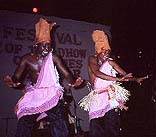23 July 2003
MediaNews 10 - July 2003
Zanzibar International Film Festival
The world for the visitors – The island for the people
By Klaartje Jaspers
From 28 June onwards Zanzibar is dominated for two weeks by the annual Zanzibar International Film Festival (ZIFF). Its objectives are to promote social and economic growth in the region through cultural productions. In addition it wants to spotlight the Dhow culture. Has the festival so far succeeded in fostering her objectives?
 |
| www.ziff.or.tz |
The festival of the Dhow countries, as the ZIFF is more aptly popularly called, has since 1997 annually been transforming the capital Stonetown into a cultural feast full of dance, film, documentaries, music and theatre for two weeks in July.
The festival is a colourful show for its visitors and a welcome diversion for the inhabitants who are able to benefit from the festivals activities and the additional income generated by the great numbers of visitors.
additional source of income
In the park boys sell juice they have squeezed out of sugar cane, lime and ginger. An American hotel guest hesitates before buying a piece of lobster. On the quay a group of youngsters gathers around the tables where a wrinkly man serves the sweet and spicy Zanzibari tea.
promoting the Dhow-culture
Unwittingly these sellers are the personification of the organisation’s second objective: to promote the Dhow culture. The multi-cultural island of Zanzibar is supposed to be the shining example. According to the ZIFF, the dhow – the small single-sailed fishing boat the Arabs decorated the African shores with – symbolises cultural diversity, co-operation and individual integrity. The festival wants to be a breeding ground for a better understanding between the nations.
cultural exchange
Looking into the festival programme, one finds a broad selection of African, Asian and Arab productions. In front off the Palace a group of Masai warriors, in the House of Wonders a white South African tells a Danish filmmaker how she is shaking off apartheid; band from Palestine knocks about the adjacent in the Mambo Club of the old Amphitheatre.
A colourful crowd is gathering on the field. Brilliant turbans, rough sandals made from car tyres, sparkling décolleté dresses and loaded rastacaps seem to be the ingredients of a hidden competition. Hips are shaking, hands clapping, voices rising. Judged from what we see here the cultural exchange seems to be a big success.
 | | Dancers Saida Karoli |
no money for translation
The bottleneck in this exchange is to be found particularly on the local level: the islanders who do not understand the Asian and Afro-European films. Nearly all productions, a few Arabic-spoken works excluded, are in English. Either spoken or subtitled. Therefore incomprehensible for those who do not speak or read English, especially if they are not familiar with the subject or the form.
misunderstanding
When a priest starts raping a beautiful young girl who, in danger of being killed, has sought refuge in his church (‘100 Days’, Nick Hughes - UK, 2001), a group of young men in the back seats of the cinema rises. They spur him on.
‘They don’t understand what’s going on,’ an Zanzibari sighs. ‘They are drunk and don’t understand the texts.’ He is ashamed of his fellow-islanders. What is normally considered to be a devout islamic paradise now seems to reveal itself as a place full of ill-mannered drunks. Whether a box-office winner or not, translating a movie such as ‘100 Days’ – the story of a love affair set against the background of the genocide in Rwanda – into kiSwahili is simply too expensive.
local population
Yet the local rural population must be given a chance to taste the cultural diversity of the Dhow region, the organisers of the festival agree. Television won't give them that chance; African networks choose Western box-office hits in preference to uncertain local initiatives. The filmmakers see the limited budgets of their national broadcasting corporations being drained off into the pockets of big American soap producers.
education
Therefore the festival dedicates itself to present the local people a programme itself. Instead of making productions more accessible by offering proper introduction, however, the festival resorts to a more traditional concept: education. Often through locally-produced works – music, poetry, theatre, discussions, fashion shows, a mobile cinema, and lots of sports. Specially designed panoramas are used to address local women, children and villagers. The programme on the remote island of Pemba, where hardly any tourist’s foot has trod, deals with a number of suspiciously familiar themes: women’s groups, Aids, drug abuse, malaria, malnutrition, teen-age pregnancy, and preserving seafood. The festival’s missionary work – with best wishes from Stonetown. Zanzibar International Film Festival is partner of NiZA's Mediaprogramme (broadcasting unit) - www.ziff.or.tz
Klaartje Jaspers works as a freelance journalist in central and southern Africa. More information can be found at www.klaartjejaspers.com
|

